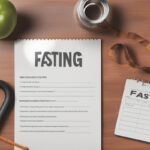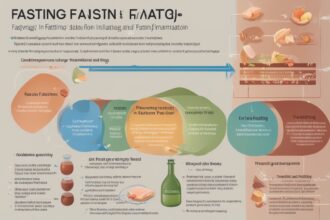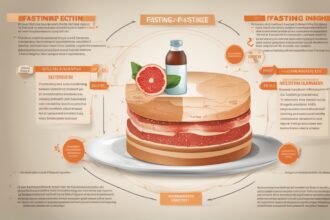Fasting has long been recognized as a powerful tool for improving health and well-being. Among its many benefits, one area gaining significant attention is its potential to reduce inflammation in the body. Inflammation, often manifesting as swelling, can be a root cause of numerous chronic conditions. This post explores how periodic abstinence from food, a practice commonly known as fasting, can play a vital role in reducing swelling through periodic abstinence. By delving into the science, methods, and benefits of fasting, we aim to provide a comprehensive guide for those seeking natural ways to combat inflammation.
What Is Inflammation and Why Does It Cause Swelling?
Inflammation is the body’s natural response to injury, infection, or stress. It is a protective mechanism designed to heal and defend against harmful stimuli. However, when inflammation becomes chronic, it can lead to swelling, pain, and a host of health issues such as arthritis, heart disease, and autoimmune disorders. Swelling occurs when fluid accumulates in tissues as part of the inflammatory response, often accompanied by redness and discomfort. Chronic inflammation is often fueled by poor diet, stress, and lifestyle factors, making it a critical issue to address. By focusing on reducing swelling through periodic abstinence, fasting offers a promising approach to managing this condition naturally.
How Fasting Impacts Inflammation in the Body
Fasting, or periodic abstinence from food, triggers several physiological changes that can help combat inflammation. During fasting, the body shifts from using glucose as its primary energy source to burning stored fats through a process called ketosis. This metabolic switch has been shown to lower levels of pro-inflammatory cytokines, which are molecules that drive inflammation. Additionally, fasting promotes autophagy, a cellular “clean-up” process that removes damaged cells and reduces inflammatory triggers. Studies suggest that even short-term fasting can significantly decrease markers of inflammation, making it an effective strategy for reducing swelling through periodic abstinence. For more on how fasting impacts overall health, check out our post on Fasting Benefits for Overall Health.
Types of Fasting for Reducing Swelling
There are several fasting methods that can aid in reducing swelling through periodic abstinence, each with unique benefits. Intermittent fasting (IF), such as the 16:8 method (fasting for 16 hours and eating during an 8-hour window), is a popular choice for beginners. Time-restricted eating helps regulate blood sugar and reduce inflammatory markers. Another option is the 5:2 diet, where individuals eat normally for five days and restrict calories to 500–600 on two non-consecutive days. Extended fasting, lasting 24–72 hours, may offer deeper anti-inflammatory effects but should be approached with caution and medical supervision. To learn more about choosing the right fasting method, read our guide on Types of Fasting for Beginners.
Scientific Evidence Supporting Fasting for Inflammation Reduction
Research increasingly supports the role of fasting in reducing inflammation and swelling. A 2019 study published in Cell found that fasting reduces the activity of the NLRP3 inflammasome, a key driver of inflammation in the body. Another study from the Journal of Clinical Investigation showed that intermittent fasting lowers levels of C-reactive protein (CRP), a marker of systemic inflammation. These findings highlight how reducing swelling through periodic abstinence is not just anecdotal but grounded in science. Fasting also improves gut health by promoting a balanced microbiome, which further reduces inflammation. For additional insights into gut health and fasting, explore our article on Fasting and Gut Health.
Practical Tips for Starting a Fasting Routine to Reduce Swelling
Embarking on a fasting journey to address inflammation requires preparation and mindfulness. Start by choosing a fasting method that fits your lifestyle, such as intermittent fasting, which is less intimidating for newcomers. Stay hydrated during fasting periods, as dehydration can exacerbate inflammation. Break your fast with anti-inflammatory foods like leafy greens, fatty fish, and berries to maximize the benefits of reducing swelling through periodic abstinence. Avoid overeating or consuming processed foods after fasting, as this can negate the anti-inflammatory effects. It’s also wise to consult a healthcare provider before starting, especially if you have underlying health conditions. For meal ideas post-fast, see our post on Anti-Inflammatory Meals After Fasting.
Potential Risks and Considerations When Fasting
While fasting offers significant benefits for reducing swelling through periodic abstinence, it’s not without risks. Prolonged fasting or improper practices can lead to fatigue, nutrient deficiencies, or exacerbate certain medical conditions like diabetes. Pregnant women, individuals with eating disorders, or those on specific medications should avoid fasting unless under medical guidance. Listen to your body and stop if you experience dizziness, extreme hunger, or other adverse effects. For a deeper dive into fasting safety, refer to our article on Fasting Safety Tips.
Disclaimer: The information provided in this article is for educational purposes only and should not be considered medical advice. Fasting may not be suitable for everyone, and individual results may vary. Always consult with a healthcare professional or nutritionist before starting any fasting regimen, especially if you have pre-existing health conditions or are taking medications. We are not responsible for any adverse effects resulting from following the suggestions in this post.
References
- Jordan, S., et al. (2019). Dietary Intake Regulates the Circulating Inflammatory Monocyte Pool. Cell.
- Stekovic, S., et al. (2019). Alternate Day Fasting Improves Physiological and Molecular Markers of Aging in Healthy, Non-obese Humans. Journal of Clinical Investigation.
- Longo, V. D., & Mattson, M. P. (2014). Fasting: Molecular Mechanisms and Clinical Applications. Nature Reviews Neuroscience.
- Harvard Medical School. (2021). Foods That Fight Inflammation. Harvard Health Publishing.
- Mayo Clinic. (2022). How to Use Food to Help Your Body Fight Inflammation.
This content is for informational purposes only and not a substitute for professional advice.






